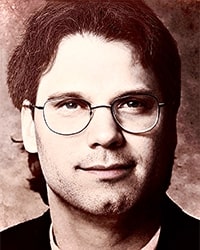Media Hall of Fame - Rich Robinson

Rich Robinson, 1979-84, Journalism: Robinson, a native of Howell, Michigan, was selected as one of six 2024 honorees who have distinguished themselves in their professions. After studying journalism at Central Michigan University and working as a reporter, columnist and finally editor-in-chief at CM Life, Robinson ended up moving to Hollywood, where he spent 20 years building a high-profile career as a journalist, publicist and Emmy-winning television producer. Following his career in the entertainment industry, he served for a dozen years as a communications strategist for nonprofit organizations in Washington, D.C.
In Hollywood, Robinson worked with many music superstars as a publicist, including the Rolling Stones, Janet Jackson and Quincy Jones. As a producer, he created more than 1,200 celebrity segments for Comedy Central's quirky talk show, "Turn Ben Stein On," Fox TV's "Good Day LA" and other programs. Prior to his television and publicity work, Robinson wrote a music column for the Los Angeles Reader, an alternative weekly newspaper, and also managed a successful L.A. indie rock band of former CMU students called The Leonards.
By 2009, Robinson transitioned to advocacy communications in our nation’s capital, where he worked with a series of key nonprofit organizations dedicated to strengthening democracy in America. Much of his advocacy career centered on citizen engagement with their elected officials, and protecting voting rights of historically marginalized communities - people of color, students, and the impoverished.
“I had an amazing, wonderful career in Hollywood,” he said, “but my advocacy communications work in DC is what brings me the greatest satisfaction. Protecting citizens’ right to vote is probably the most important thing I did in my diverse career, and it’s the work for which I am most proud.”
Robinson has written about media and politics in HuffPost, has been quoted and placed op-eds in newspapers across the country, and has done numerous broadcast interviews including on Air America Radio, the BBC, Reuters, and Sirius XM’s “Tell Me More with John Fugelsang.”
He believes CMU is where his stage was set for success.
“CMU is the kind of place where you can realize your potential. It’s not a place where you will get lost in the crowd, yet it has all the hallmarks of a major school,” he said.
Robinson first stepped on the CMU campus during Little Siblings weekends while his older brother and sister were students, providing him with an early appreciation for the university. During high school, Robinson helped launch and was a columnist and sports editor for The Main Four, the school’s newspaper, which was published weekly in The Livingston County Press. The paper’s faculty adviser made sure their office received copies of the various college newspapers around the state, and Robinson noticed that 95% of CM Life’s stories were written by students, not just cut-and-paste wire copy, which to him was telling.
“It looked pretty obvious which journalism school in the state would be most beneficial,” he said. “Besides, I really liked CMU’s ‘small school’ feeling, even though it’s a bigger academic institution. I remember my first day moving into Emmons Hall with my hometown buddy and it took us all of 10 minutes to acclimate to the campus. It felt like home.”
Robinson credited several courses as providing the academic experience he needed to succeed.
“My Media Law class with Dr. Mike Petrick was crucial, and the design class I took with Dr. Tom Rood not only taught me how to do layout, but how to have a critical eye for visual aesthetics. Now, I tell students to learn Photoshop and InDesign,” he said. “I took a lot of history classes, Russian history and sociology, and philosophy classes. Those, along with Dr. Guy Meiss’ Press and Society course, all helped with teaching me how to think. Everything at CMU provided context.”
Robinson’s professors took a special interest in his academic development during his years at CMU and provided the foundation upon which he could find his future.
“Mike Petrick for sure. He was also my advisor, and we became friends, socially,” he said. “Ron Marmarelli taught me sports writing, as well as magazine writing, and Guy Meiss even wrote a letter of recommendation for me to become editor of CM Life. Not only did these professors provide excellent journalism instruction, outside the classroom they were fantastic examples of how to be a good human being.”
Robinson offers some advice to aspiring journalists:
“If you’re looking to be a reporter, embrace your traditional role of holding those in power accountable at all levels, not just federal but local, especially in this era of less coverage of elected officials,” he said. “Be entrepreneurial, learn multiple skills, learn to shoot and edit compelling videos; get good on social media. Have a voice. The ballgame has changed, and smart journalists will adapt to the evolving media landscape.”
